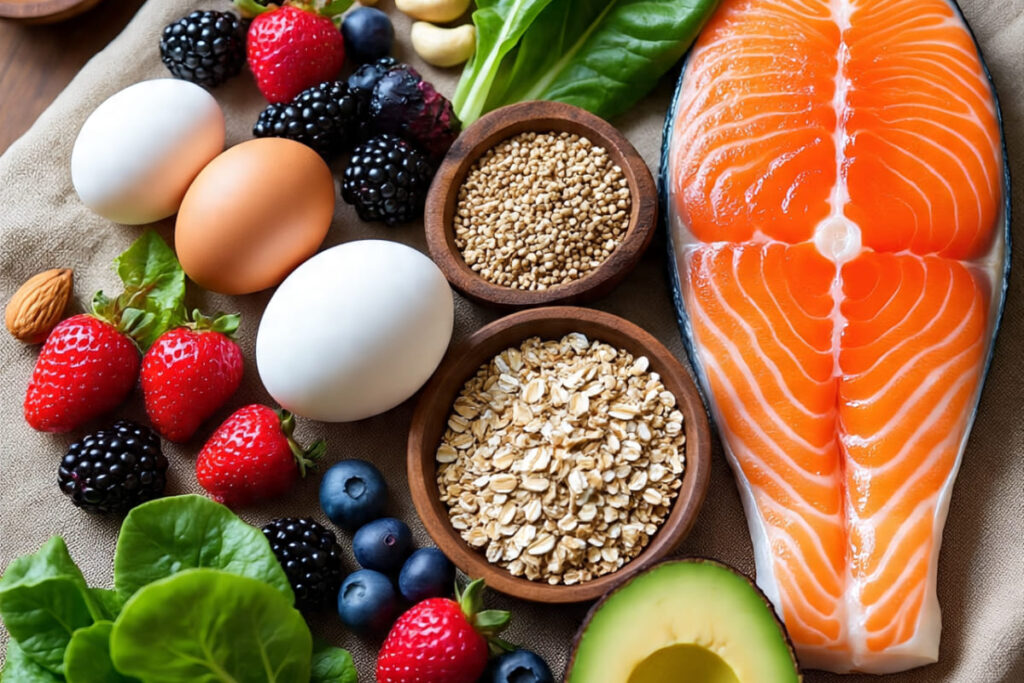Let’s be honest: every little decision feels like a huge one when you’re actually trying to conceive. It is simple to become engrossed in the chaos, from using apps to track ovulation to lusting for a second cup of coffee. However, in the midst of the chaos, food magically turns into your worst enemy or your secret friend. Your nutrition influences your reproductive health besides satisfying your hunger.
Therefore, it might be time to make some changes to your plate if you’re attempting to conceive. We won’t embarrass you into buying that chocolate bar, so don’t worry. This isn’t flawless. Your body is being pushed in the proper way by this actual food with real advantages.
The Significance of Diet in Fertility
You would suppose that hormones alone determine fertility. In actuality, though, your food has a much bigger influence than most people realize. Your body needs the right nourishment to prepare for pregnancy, maintain hormone balance, and create a welcoming environment for new life.
Nutrients like folate, iron, omega-3s, and zinc are not just trendy phrases; they are necessary for ovulation, hormone balance, and egg quality. The goal is not to obsess over every food, but to develop habits that boost the likelihood of conception. Furthermore, even if you are not TTC (trying to conceive), these meals are highly good to your overall health.
The All-Stars of Fertility Boosting
1. Leafy Greens: Your Hormone Supporters
If a vegetable, such as spinach, kale, or Swiss chard, looks like it would work nicely in a bunny salad, it probably should be on your plate too. Folate, often known as mother nature’s folic acid, is abundant in leafy greens and is necessary for normal ovulation and the prevention of neural tube abnormalities in the event of pregnancy.
Extra? They aid in liver detoxification, which is important because your liver bears the brunt of the burden of getting rid of extra hormones. This is your reproductive system’s spring cleaning.
Try: Sauté kale with garlic as a supper side dish or add a handful of spinach to your smoothie.
2. Fatty Fish:
Fuel for Your Eggs Omega-3 fatty acids, found in large quantities in oily fish such as mackerel, sardines, and salmon, help regulate reproductive hormones, enhance the quality of eggs, and even strengthen the uterine lining. People, that means better implantation conditions.
Furthermore, omega-3s have anti-inflammatory qualities, which is beneficial if you have PCOS (polycystic ovarian syndrome) or endometriosis, two conditions that can significantly reduce fertility.
Try: Once or twice a week, grilled salmon. Take an excellent fish oil supplement if you just don’t like fish (after seeing your doctor, of course).
3. The Slow Burners: Whole Grains
Complex carbs, such as quinoa, brown rice, and oatmeal, do not cause blood sugar levels to rise way their refined counterparts do. Stable blood sugar is a prerequisite for more stable insulin levels since insulin and reproductive hormones either complement each other or are mutually exclusive, depending on what is being consumed.
For instance, insulin resistance is frequently linked to PCOS, thus moving from white bread to whole grains is not only a fantastic idea, but also necessary.
Try it: For dinner, a warm dish of quinoa with roasted vegetables; for breakfast, overnight oats.
4. Strong Antioxidants in Berries
Tiny yet potent are blueberries, raspberries, and blackberries. These little fruits contain antioxidants like vitamin C and flavonoids that protect your eggs—and sperm, if your partner is cheating—from oxidative damage. Consider them your reproductive cells’ protectors.
Try: To make a refreshing cold snack on a hot day, freeze them or sprinkle a few handfuls over your yogurt.
5. Nuts and Seeds: Little Nutrient Powerhouses
Almonds, walnuts, sunflower seeds, and pumpkin seeds are little powerhouses that should not be undervalued. They are high in vitamin E, zinc, and selenium, all of which promote hormone production and egg quality.
In instance, pumpkin seeds significantly improve the balance of progesterone and estrogen. Walnuts? filled with omega-3. Here, you can’t go wrong.
Try adding raw nuts and seeds to your trail mix or to your salad for crunch.
6. Full-Fat Dairy: The Ignored Boo Boo
Research suggests that whole milk may be even more beneficial for fertility than skim or low-fat milk. Ovulation and hormone homeostasis are somehow supported by the healthy fats found in whole milk, cheese, and yogurt.
Your hormones love good fats, even if it goes against everything you’ve learned from the low-fat fad of the 1990s.
Give it a try: Greek yogurt with chopped walnuts and honey drizzle.
7. The Original Fertility Food: Eggs
A nutritious treasure trove is eggs. They contain protein, which aids in blood sugar homeostasis and tissue repair, choline, which is excellent for the development of the fetal brain, and vitamin D, which is essential for hormone regulation.
Choose organic or pasture-raised eggs whenever possible because they usually have a higher nutritional profile, particularly in the yolks, which are where most of the fertility magic is found.
Try a vegetable omelette or scrambled eggs for a quick snack.
What Must I Stay Away From?
Well, nobody is urging you to give up your Friday night fries or your Saturday morning coffee. However, the following ought to stay on the “not-too-often” list:
- Processed meats: Excessive saturated fat and additional ingredients throw off the hormone balance.
- The reproductive kryptonite is trans fats. In some baked items, fried dishes, and margarines.
- Because it interferes with insulin, too much sugar throws everything else off balance.
- Overconsumption of caffeine: If you’re having trouble getting pregnant, ingesting more than 200 mg of caffeine daily—about one strong cup of coffee—may reduce your chances.
- Alcohol: While little amounts may be acceptable occasionally, what about heavy use? Definitely not if you’re TTC.
Male Fertility Is Also Deserving of a Plate
Not just women’s diets have an impact on fertility. Men’s diet has a big impact on the quality of their sperm. Therefore, include your spouse in this as well, if he is open to it. The motility, morphology, and quantity of sperm depend on antioxidants, vitamin C, zinc, and selenium.
Stock him up:
- SELINUM Brazil nuts
- Vitamin C-rich citrus fruits
- Folate-containing spinach
- Omega-3 salmon
- Zinc, if he’s feeling daring, oysters
A Kind Word About Supplements
The primary focus should always be on food, but if you’re experiencing problems acquiring particular minerals, such as vitamin D in the winter or iron if you’re plant-based, supplements may be helpful. However, don’t merely use medicines without first talking to a doctor. One significant issue is fertility, where more isn’t always better.
Final Thoughts: Food Is Not Stress, It’s Strength
It’s crucial to realize that dietary modifications won’t produce a child. It is not possible to conceive with a blueberry alone. What you do consume, though, will definitely tip the balances in your favor and lift your spirits.
Fertility is a complex process. Infuriatingly so at times. Food, however, is something you do have some control over in a process with so many moving parts. Whether it manifests as a new life this month or in six months, you should be pleased of the fact that you are taking care of your body and making room for it.
Breathe, then. Place real, nutrient-dense, colorful food on your plate. Additionally, remember that this is not a punishment. It’s a self-loving, peaceful gesture.
You’re capable.
FAQs:
Yes, some foods support hormone balance, egg quality, and ovulation. In fact, a fertility-friendly diet can improve both male and female reproductive health.
Leafy greens, full-fat dairy, avocados, and berries are great options. Moreover, these foods are rich in antioxidants, folate, and healthy fats—all crucial for hormone function.
Yes, absolutely. Yes, foods like walnuts, tomatoes, and zinc-rich options help improve sperm quality and motility.
Yes, it’s best to limit them. Processed foods often contain trans fats, excess sugar, and chemicals that may interfere with hormone regulation.
It depends, but generally 3–6 months of dietary improvements can make a noticeable difference. Because of this, starting early is beneficial.



1 Comment
Pingback: How Lifestyle Choices Shape Your Fertility: What Helps & Hurts